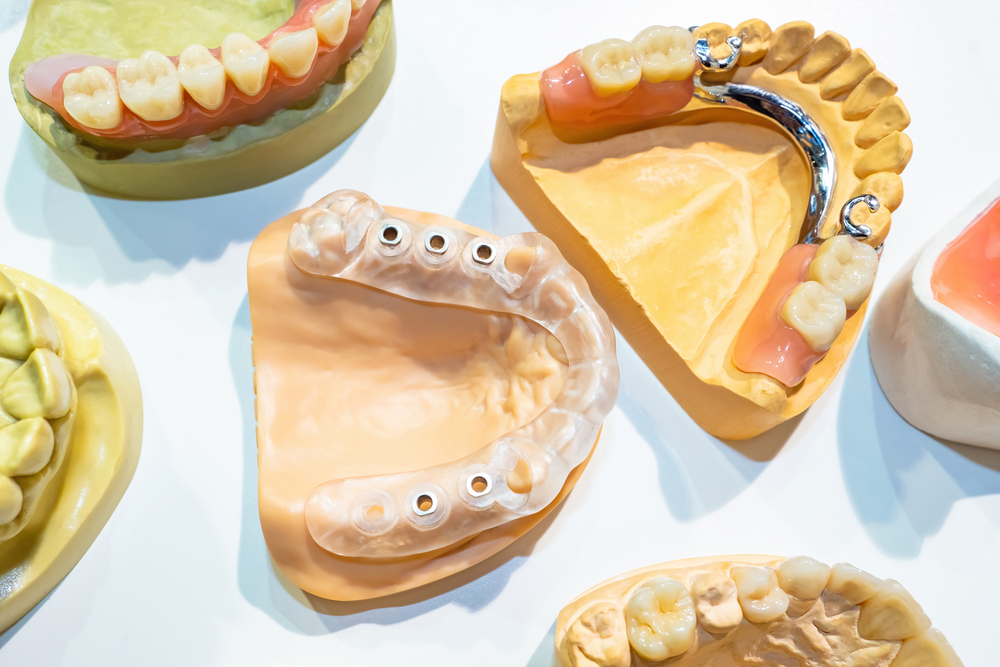Over the years, restorative dentistry has come a long way. Gone are the days when dentures were your only option for replacing missing or damaged teeth. Today, dental implants offer a modern, long-lasting solution that looks, feels, and functions like a natural tooth. That said, there are a number of types of dental implants available, and choosing the right one for you is an essential part of the process.
What Are Dental Implants?
The first step to choosing the right type of dental implant is to understand what they are in the first place. Dental implants are artificial tooth roots, typically made from titanium, that are surgically implanted in the jawbone. Over time, they bond with the bone, creating a stable foundation for crowns, bridges, or dentures.
These dental implants not only restore your ability to chew and speak comfortably—they also help prevent bone loss and retain your facial structure. With proper care, dental implants can last a lifetime. They’re designed to be strong, secure, and natural-looking, making them one of the most reliable solutions in modern dentistry.
Types of Dental Implants
Endosteal Implants
This is the most common type of dental implant. Endosteal implants typically consist of a titanium screw that is placed directly into the jawbone and are ideal for patients with good bone density.
This type of dental implant is typically recommended for patients who are missing one or more teeth, and have a strong, healthy jawbone.
Benefits include:
- Long lasting
- High success rate
- Mimics the feel and function of natural teeth
Subperiosteal Implants
These implants are a good alternative for patients with insufficient bone density. Rather than being inserted into the jaw, subperiosteal implants rest on top of the jawbone, under the gum tissue. A metal frame is then used to support the implant posts.
These implants are ideal for patients who lack sufficient healthy jawbone and are not candidates for bone grafting.
Benefits include:
- Less invasive than bone grafting
- Suitable for patients with shallow jawlines
- Often faster recovery time
Zygomatic Implants
This type of dental implant is used in extreme cases of bone loss in the upper jaw. Zygomatic implants are longer than standard implants and are anchored into the cheekbone rather than the upper jawbone. This method is more complex and is typically only used when other implants aren’t an option.
Benefits include:
- Eliminates the need for bone grafts
- Provides support for dentures, bridges, or crowns
- Effective when replacing all teeth in the upper jaw
All-On-4 Implants
This is a full-arch solution that uses four implants. The all-on-4 implants involve strategically placing four implants in the jawbone to support a complete set of upper or lower teeth. This technique maximizes the use of the existing bone and prevents the need for bone grafting.
This type of dental implant is ideal for patients missing most or all of their teeth, and who want a stable, fixed alternative to dentures.
Benefits include:
- Fewer implants required
- Reduced healing time
- Immediate function and aesthetic
- More cost-effective than replacing each tooth individually
Mini Dental Implants
These small but mighty dental implants are similar to traditional implants, but are smaller in diameter. They’re often used to stabilize lower dentures or are placed in areas with less available bone.
Mini dental implants are ideal for patients who need a less invasive option, have limited space or bone density, or want a more affordable alternative.
Benefits include:
- Less invasive procedure
- Faster recovery time
- Can often be placed and restored in one visit
- Cost-effective
Other Benefits of Dental Implants
Regardless of the type of dental implant you choose, all of them offer significant benefits over other tooth replacement options, including:
Improved Self-Confidence
Implants look and feel like natural teeth, helping you restore your smile and your confidence.
Enhanced Function
Dental implants allow you to chew and speak more comfortably than with traditional dentures or bridges.
Bone Preservation
Because dental implants stimulate the jawbone, they help to prevent bone loss that typically occurs after we lose a tooth.
Durability and Convenience
With proper care, all types of dental implants can last for decades. They also eliminate the need for messy adhesives or nighttime removal, making them a low-maintenance option.
Which Type of Dental Implant is Right for You?
Choosing the right type of dental implant depends on several factors, including:
- The number of teeth you’re missing
- The health and density of your jawbone
- Your oral and general health
- Your budget and desired outcome
When it comes to choosing the type of dental implant that suits you best, your dentist will conduct a comprehensive examination to determine the most suitable option for your needs.
Reclaim Your Smile With the Team at Beddington Heights
If you’re missing one or more teeth, dental implants offer a reliable, natural-looking solution that will keep you smiling for years to come. At the Dentists at Beddington Heights, we’re here to guide you through every step of the way, helping you choose the right type of dental implant for you.
Worried about paying for your dental implants? We are proud to accept patients under the Canadian Dental Care Plan!
Our friendly and experienced team provides thorough evaluations and custom treatment plans tailored to your needs. If you’re ready to take the next step, call Dentists at Beddinton Heights to learn more or book your implant consultation.



